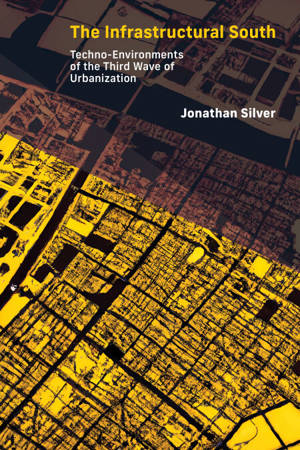
- Afhalen na 1 uur in een winkel met voorraad
- Gratis thuislevering in België vanaf € 30
- Ruim aanbod met 7 miljoen producten
- Afhalen na 1 uur in een winkel met voorraad
- Gratis thuislevering in België vanaf € 30
- Ruim aanbod met 7 miljoen producten
Zoeken
The Infrastructural South E-BOOK
Techno-Environments of the Third Wave of Urbanization
Jonathan Silver
€ 49,28
+ 49 punten
Omschrijving
An in-depth look at the infrastructural landscape of Africa amid the third wave of urbanization, drawing on case studies from Africa and extending further afield.
The Infrastructural South represents a major theoretical contribution to the study of infrastructure’s role in the third wave of urbanization centered on Africa. Based on over a decade of empirical research, Silver’s sweeping examination probes many of contemporary urbanism’s most exciting and pressing issues through the lens of the Global South. Focusing on Uganda, Ghana, and South Africa, Silver’s conceptually innovative chapters explore the way access to energy, water, sanitation, transit, and information technologies shape everyday life as they map the dynamic relations between cities, technology, and the environment.
Pushing readers to look at the wider worlds that suffuse urban systems, this theoretical and geographical perspective treats Africa’s rapidly transforming towns and cities as complex sites of disruption, emancipation, and contradiction. In doing so, it shows how the proliferating urbanisms and contested techno-environments arise from shifting priorities in infrastructure planning, politics, and financing gaps.
As urban issues become a key twenty-first-century challenge for Africa, Silver offers a comprehensive reworking of our understanding of urbanization. The Infrastructural South rethinks how global scholarship approaches infrastructure, laying pathways for future research at the intersection of technology, environmental urbanism, and urban politics.
The Infrastructural South represents a major theoretical contribution to the study of infrastructure’s role in the third wave of urbanization centered on Africa. Based on over a decade of empirical research, Silver’s sweeping examination probes many of contemporary urbanism’s most exciting and pressing issues through the lens of the Global South. Focusing on Uganda, Ghana, and South Africa, Silver’s conceptually innovative chapters explore the way access to energy, water, sanitation, transit, and information technologies shape everyday life as they map the dynamic relations between cities, technology, and the environment.
Pushing readers to look at the wider worlds that suffuse urban systems, this theoretical and geographical perspective treats Africa’s rapidly transforming towns and cities as complex sites of disruption, emancipation, and contradiction. In doing so, it shows how the proliferating urbanisms and contested techno-environments arise from shifting priorities in infrastructure planning, politics, and financing gaps.
As urban issues become a key twenty-first-century challenge for Africa, Silver offers a comprehensive reworking of our understanding of urbanization. The Infrastructural South rethinks how global scholarship approaches infrastructure, laying pathways for future research at the intersection of technology, environmental urbanism, and urban politics.
Specificaties
Betrokkenen
- Auteur(s):
- Uitgeverij:
Inhoud
- Aantal bladzijden:
- 330
- Taal:
- Engels
- Reeks:
Eigenschappen
- Productcode (EAN):
- 9780262376730
- Verschijningsdatum:
- 9/10/2023
- Uitvoering:
- E-book
- Beveiligd met:
- Adobe DRM
- Formaat:
- ePub

Alleen bij Standaard Boekhandel
+ 49 punten op je klantenkaart van Standaard Boekhandel
Beoordelingen
We publiceren alleen reviews die voldoen aan de voorwaarden voor reviews. Bekijk onze voorwaarden voor reviews.







